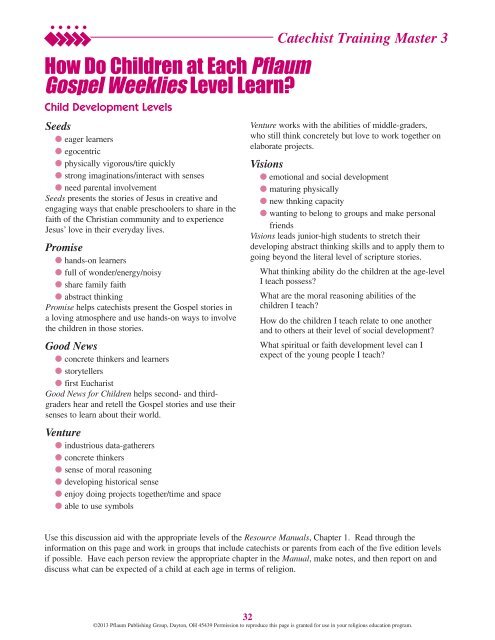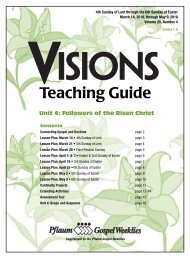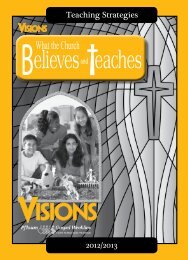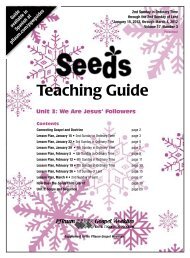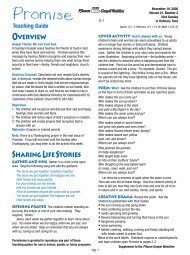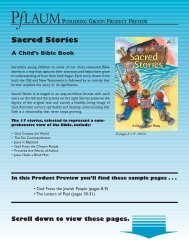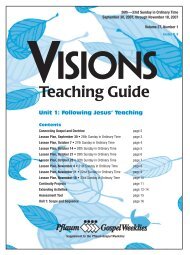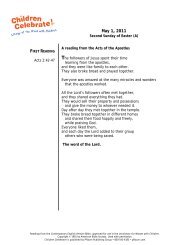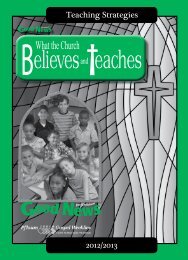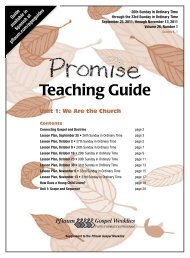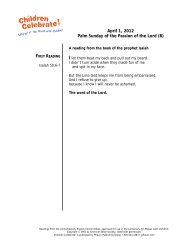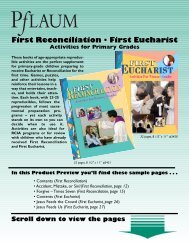Catechist Training Master 1 - Pflaum Home
Catechist Training Master 1 - Pflaum Home
Catechist Training Master 1 - Pflaum Home
Create successful ePaper yourself
Turn your PDF publications into a flip-book with our unique Google optimized e-Paper software.
How Do Children at Each <strong>Pflaum</strong><br />
Gospel Weeklies Level Learn?<br />
Child Development Levels<br />
Seeds<br />
● eager learners<br />
● egocentric<br />
● physically vigorous/tire quickly<br />
● strong imaginations/interact with senses<br />
● need parental involvement<br />
Seeds presents the stories of Jesus in creative and<br />
engaging ways that enable preschoolers to share in the<br />
faith of the Christian community and to experience<br />
Jesus’ love in their everyday lives.<br />
Promise<br />
● hands-on learners<br />
● full of wonder/energy/noisy<br />
● share family faith<br />
● abstract thinking<br />
Promise helps catechists present the Gospel stories in<br />
a loving atmosphere and use hands-on ways to involve<br />
the children in those stories.<br />
Good News<br />
● concrete thinkers and learners<br />
● storytellers<br />
● first Eucharist<br />
Good News for Children helps second- and thirdgraders<br />
hear and retell the Gospel stories and use their<br />
senses to learn about their world.<br />
Venture<br />
● industrious data-gatherers<br />
● concrete thinkers<br />
● sense of moral reasoning<br />
● developing historical sense<br />
● enjoy doing projects together/time and space<br />
● able to use symbols<br />
<strong>Catechist</strong> <strong>Training</strong> <strong>Master</strong> 3<br />
Venture works with the abilities of middle-graders,<br />
who still think concretely but love to work together on<br />
elaborate projects.<br />
Visions<br />
● emotional and social development<br />
● maturing physically<br />
● new thnking capacity<br />
● wanting to belong to groups and make personal<br />
friends<br />
Visions leads junior-high students to stretch their<br />
developing abstract thinking skills and to apply them to<br />
going beyond the literal level of scripture stories.<br />
What thinking ability do the children at the age-level<br />
I teach possess?<br />
What are the moral reasoning abilities of the<br />
children I teach?<br />
How do the children I teach relate to one another<br />
and to others at their level of social development?<br />
What spiritual or faith development level can I<br />
expect of the young people I teach?<br />
Use this discussion aid with the appropriate levels of the Resource Manuals, Chapter 1. Read through the<br />
information on this page and work in groups that include catechists or parents from each of the five edition levels<br />
if possible. Have each person review the appropriate chapter in the Manual, make notes, and then report on and<br />
discuss what can be expected of a child at each age in terms of religion.<br />
32<br />
©2013 <strong>Pflaum</strong> Publishing Group, Dayton, OH 45439 Permission to reproduce this page is granted for use in your religious education program.


